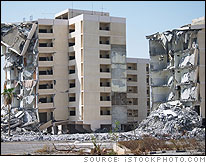2010 Year in Review: World News - Haiti

Major World News Stories of 2010
Few Signs of Progress Lead to Protracted U.S. Involvement in Afghanistan | Greece and Ireland Battered by Financial Crisis | The Ground Shakes in Haiti | Undaunted by Sanctions, Iran Continues to Pursue Nuclear Program | Iraq Struggles to Form a Government After Election | Peace Remains Elusive for Israelis and Palestinians | North Korea Provokes South with Brinkmanship | Anti-Government Protests Continue and Turn Deadly in Thailand | Release of Secret Military, Government, and Diplomatic Documents Sparks Outrage and Controversy HaitiThe Ground Shakes in HaitiThe beleaguered country of Haiti was dealt a catastrophic blow on Jan. 12, 2010, when a magnitude 7.0 earthquake struck 10 miles southwest of Port-au-Prince, the country's capital. It is the region's worst earthquake in 200 years. The quake leveled many sections of the city, destroying government buildings, foreign aid offices, and countless slums. A World CollapsedAssessing the scope of the devastation, Prime Minister Préval said, "Parliament has collapsed. The tax office has collapsed. Schools have collapsed. Hospitals have collapsed." He called the death toll "unimaginable" and certainly never thought he would report upwards of 300,000 fatalities. The United Nations mission in Haiti was destroyed, 16 members of the UN peacekeeping force in Haiti were killed, and hundreds of UN employees killed. Some schools may never reopen, leaving vast numbers of children languishing in camps or working in menial jobs, struggling to sustain themselves. As international aid poured in, the scope of the damage caused by the quake highlighted the urgent need to improve Haiti's crumbling infrastructure as rescue workers struggled to direct and transport the supplies. Haiti, the poorest country in the Western Hemisphere, suffering from endemic poverty and a practically non-existent infrastructure, now faces the aftermath of a disaster carrying a price tag between $7.2 billion to $13.2 billion. More to Come?Geologists were not surprised. The fault that ruptured violently on Jan. 12 had been building up strain since the last major earthquake in Port-au-Prince, 240 years ago. In 2008, scientists had warned that a quake could occur along what is called the Enriquillo-Plantain Garden fault zone, although they could not predict when. As for history repeating itself, the geological survey was decidedly frank: "The fault still stores sufficient strain to be released as a large, damaging earthquake during the lifetime of structures built during the reconstruction effort." Already a victim of regular hurricanes, this earthquake-devastated country confronted another challenge: cholera. In November, the Haitian government said that the death toll had reached 1,034, with 16,799 people treated for cholera or symptoms of the disease. Presidential Election Sparks ProtestsThe country was thrust into further disarray following November's presidential election. There were widespread allegations of irregularities, such as ballot-box stuffing, people casting multiple votes, discarded ballots, vandalized polling stations, and voter intimidation. Opposition candidates called for a revote, but their requests were rebuffed. On December 7, the country's electoral commission announced that Mirlande Manigat, the top vote getter, and Jude Celestin, the hand-picked candidate of Preval, would face off in the second round of voting. These results seem to contradict what election observers conducting exit polls had expected. Michel Martelly, a popular singer, was a favorite among the urban poor and early results had him coming in second, behind Manigat. The results set off protests throughout Haiti. |
- More from 2010 News of the World









